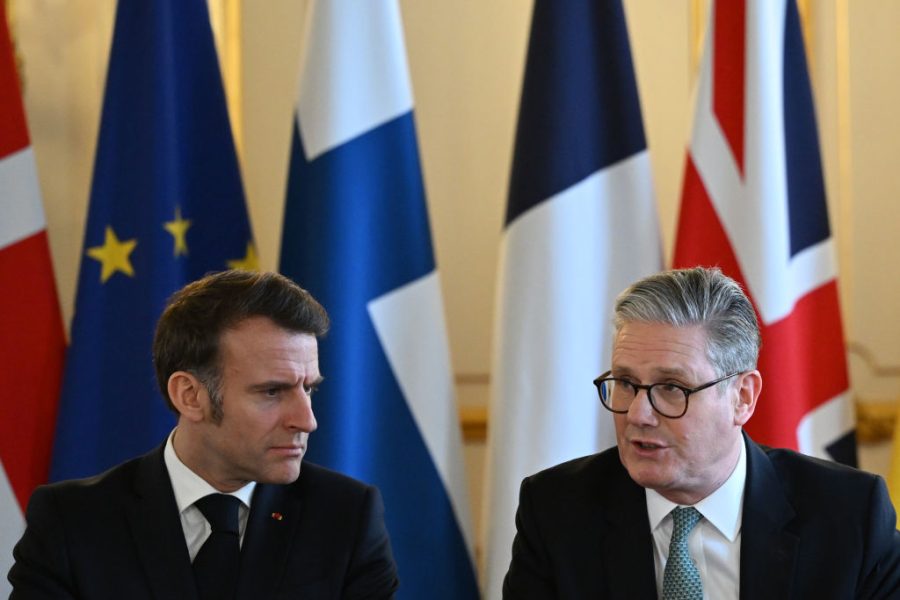Donald Trump’s recent decision to deny Ukraine access to American intelligence data in the war against Russia has concentrated minds on how the US could restrict Britain’s defence capability, from F-35 stealth jets to its independent nuclear deterrent. Some fears are well-founded. Others, such as the recent suggestion by a former French ambassador to the UK that a ‘dual key’ controls Britain’s submarine-launched Trident ballistic missiles, are a myth.
The idea is growing in some quarters that now is the moment for Britain to switch away from the US to Europe for defence equipment cooperation. One need not look too far to detect its motivation or to see its naivety. Like the US, European states such as Germany or France are also able to deny the UK use of military systems developed in collaboration, depending on the agreements and export control mechanisms in place.
Are we confident France would not restrict the deployment of joint weapons systems in our hour of need?
The Eurofighter Typhoon jet, a joint project between the UK, Germany, Italy and Spain, saw Germany block British exports in 2023 to countries like Saudi Arabia over its role in the civil war in Yemen, stymying UK arms sales. With the exception of the US, we collaborate with France on more defence projects than any other nation. But are we truly confident that France (any more than America) will not restrict the deployment of joint weapons systems in our hour of need should French interests not align?
During the Brexit fishing negotiations in May 2021, Paris threatened to cut off the electricity supply to the Channel Islands, 95 per cent of which comes by underwater cables from France. During the Covid-19 vaccine roll-out, Emmanuel Macron and the French EU Commissioner Thierry Breton were behind the Commission’s introduction of export control mechanisms to deny Britain vaccines manufactured in Europe by the British pharmaceutical group AstraZeneca. The EU also triggered Article 16 of the Northern Ireland Protocol, which, had it not been quickly rescinded, would have denied vaccine shipments to them too.
More recently, Marine Le Pen – leader of the national populist National Rally party – has emphasised that her potential presidency would see more hard-line ‘France first’ policies internationally. The far left, meanwhile, has made no bones about pursuing internationalist policies based on disarmament.
With European Union member states sliding ever rightwards, what becomes of Britain’s sovereign defence autonomy for military hardware and software developed in collaboration with EU nations with whom we no longer see eye to eye?
All this seems to be ignored in the Labour government’s rush to get its ‘EU reset’. In all the Trump-induced panic, Labour seems set on seizing this ‘divine surprise’ to implement its EU reset via the forthcoming Strategic Defence Review. But in tying Britain’s defence procurement to the EU, it would be a clear case of jumping from the frying pan into the fire.
Most jointly developed military equipment is subject to export and end-user agreements which permit partners to legally restrict their use. The US has international traffic in arms regulations (ITAR), allowing Washington to veto the use or sale of US-origin technology. Britain may have similar clauses for its equipment with which to bargain. But it is highly unlikely that the 15 per cent of British components in a F-35 could be used to stop America using the jets when it wanted.
Britain and France also operate ITAR-like clauses in many of their defence collaboration agreements involving end-use controls, technology transfers and licensing restrictions. The MBDA Storm Shadow/SCALP missile, co-developed by the UK and France, is subject to joint export approval, meaning either country can block sales if they want to.
The British-led MBDA Brimstone missile, for example, required negotiation with European partners before London could supply it to Ukraine. Marine Le Pen’s opposition to the supply of powerful weaponry to Kyiv would surely have blocked it had her party been in power, as would a minority French government containing just a couple of radical left La France Insoumise ministers.
The same applies to the Franco-British future cruise/anti-ship weapon (FC/ASW) expected to replace Exocet and Harpoon missiles, or the maritime mine countermeasures (MMCM) developed by France’s Thales and Britain’s BAE Systems. Though not as restrictive as the US, France and Britain’s defence collaboration could in some cases impact sovereign defence decisions.
Were Britain to shift focus from its American Trident missiles to collaborate more closely with France on nuclear ballistic missiles, there would be little or no improvement. Worse still, the UK would jeopardise the colossal strategic benefit derived from collaboration with America in the longstanding and mutually beneficial Five Eyes intelligence sharing partnership.
Rather than using this moment for an EU reset, Keir Starmer should be looking to develop Britain’s home-grown defence industry through serious funding. The Prime Minister should also look to restrict takeovers by foreign companies to ensure Britain retains at least a semblance of strategic defence autonomy.








Comments